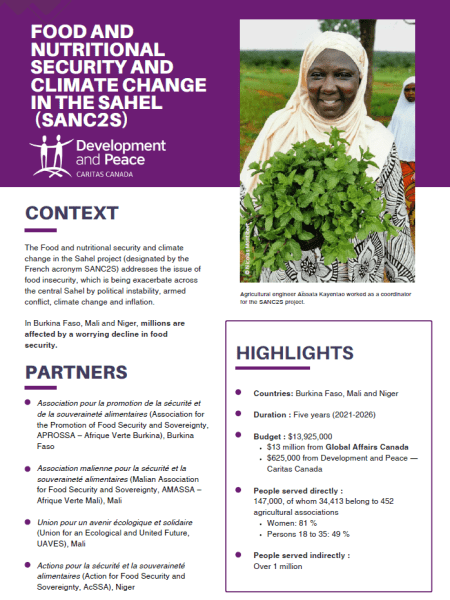The Sahel is a vast region between the Sahara desert to the north and the Sudan savannah to the south, stretching from east to west across Africa. Our Sahel program is being implemented in Burkina Faso, Mali and Niger.
Food and nutritional insecurity are major concerns for many Sahelian communities. While its food security issues stem from the combined effects of several factors including poverty, poor governance, deficient agricultural development and environmental degradation, the Sahel is also one of the regions of the world most vulnerable to the effects of climate change. Climate change exacerbates poverty, economic crises, conflicts over natural resources, political instability and gender inequities.
Armed conflict between militias and banditry also intensify poverty and nutritional insecurity by affecting livelihoods, causing displacement and impeding the implementation of sustainable agricultural practices.










In Burkina Faso, Mali and Niger, Development and Peace ― Caritas Canada supports various sustainable development initiatives.
Our humanitarian response in the region, generally addressing the fallouts of food crises, conflicts and climate disasters, reaches the most vulnerable households among the internally displaced and refugee populations and the local and host communities. More specifically, we help meet food needs at lean times; improve living conditions and livelihoods; foster social cohesion and promote environmental protection.
Implemented with local partners, the Food and nutritional security and climate change in the Sahel project (designated by the French acronym SANC2S) aims to improve the food security of almost 147,000 people, especially women and youths working in the agriculture, livestock, and fisheries sectors.
With financial support from Global Affairs Canada, the five-year project will:
Among farming communities, the project also aims to:
Development and Peace ― Caritas Canada and its local partners in the Sahel will continue promoting the resilience and sustainability of food systems in the context of climate change by supporting economically viable family farming based on sustainable, eco-friendly solutions.


To find out more about our current project in the Sahel, take a look at this summary, which includes its highlights, objectives and partners.
About us
Our work
Get involved
Ways to give
Resources
Get in touch
555 René-Lévesque Blvd. West, 8th Floor
Montreal (Quebec) Canada H2Z 1B1
Phone: 514-257-8711
Toll-free: 1-888-234-8533
Fax: 514-257-8497
Email: info@devp.org
Charity number: 1 1882 9902 RR 0001


Our international cooperation program is carried out in part with the financial support of the Government of Canada acting through Global Affairs Canada.
Development and Peace — Caritas Canada is the official international solidarity organization of the Catholic Church in Canada and the Canadian member of Caritas Internationalis.
Copyrights © 2024
Don’t miss anything about the work of our international partners or our awareness and mobilization campaigns.
Sign up now for our newsletter.